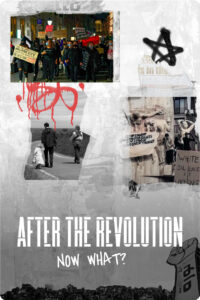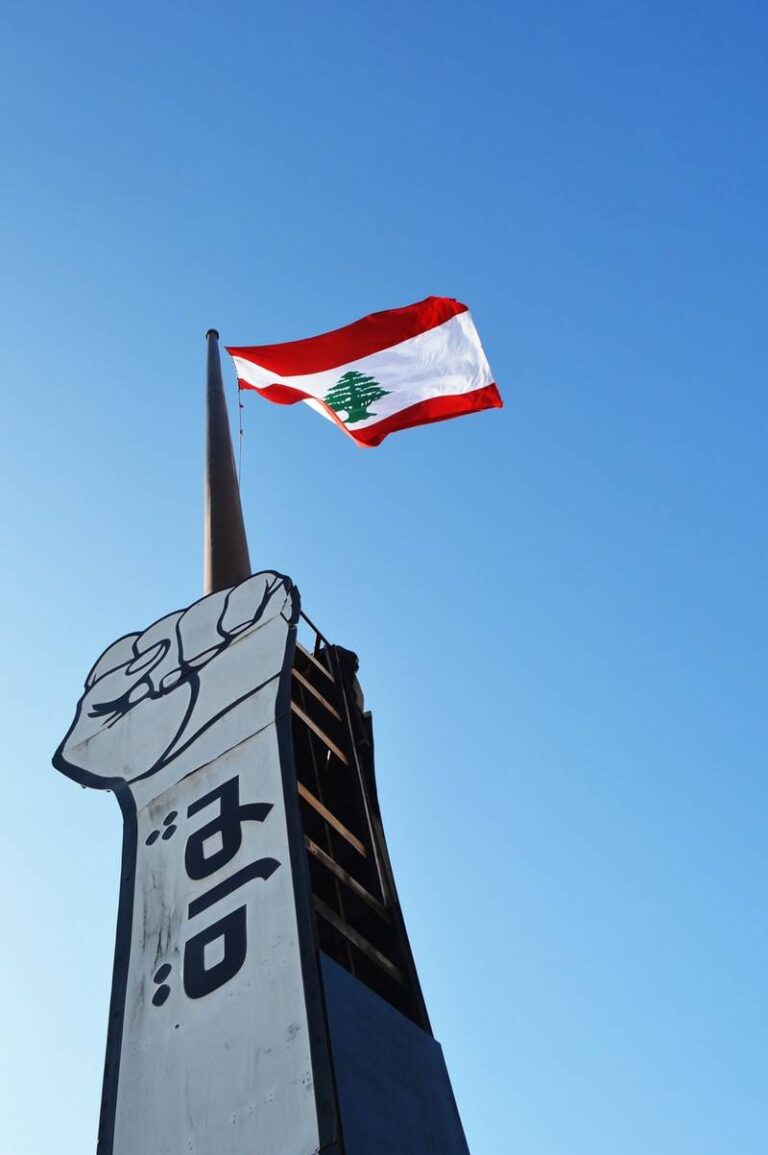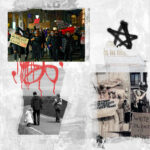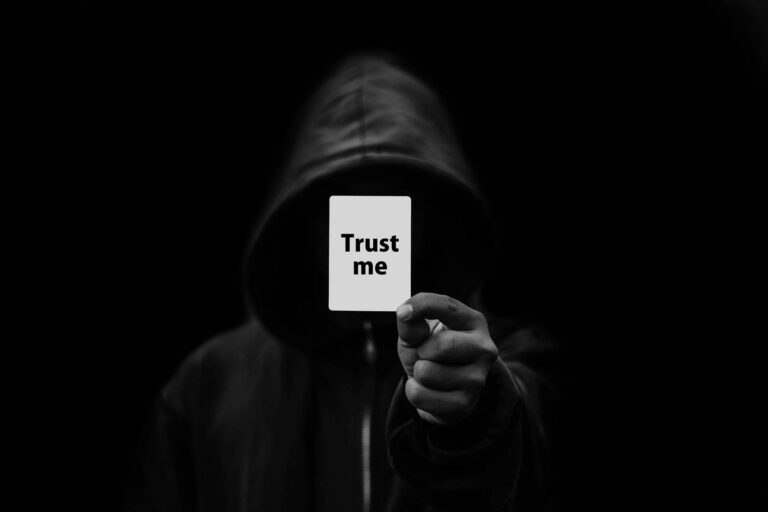Part 1: Hope – Tripoli, October 2019
Her pace suddenly accelerates, I hear her catch her breath then say: “This revolution, it was my dream!” At nearly thirty years old, Maya Khalil has attitude. With assured energy, she teaches the Arabic language to adults in a private institute in Tripoli. “But the best job I have is being the mother of my children!” she explains over the phone. However, last October, she often chose to shorten the evenings she spent with them to dash off to Sahat el Nour – the Square of Light. This busy crossroads in Tripoli quickly became the heart of the revolution.
It all started with a poisonous idea. On October 17, 2019, the Lebanese government announced that the WhatsApp application would be taxed from then on. All Lebanese had downloaded it and a torrent of voice messages had replaced overly expensive phone calls. It was too much. The Lebanese refuse to pay an additional tax while the public authorities are unable to provide even basic services. “At last the Lebanese are finally waking up!” says Maya, rejoicing in her observation. In Tripoli, where she lives, water cuts are frequent, and twelve hours of electricity are provided on lucky days. The rest of the time, to run her fridge, wash the family’s clothes or connect to the internet, she has to pay a second – hefty – bill to the generator owners.
By autumn 2019, it has been a few months with the Lebanese angrily commenting about the current events in their country, especially about the government’s negligence. Last summer, part of the country went up in smoke. Lebanon has helicopters to fight fires, but they had not been properly maintained and were not allowed to take off. On top of that, the first signs of the dreadful toll of the financial crisis comes: banks already putting limits on the amounts of money the Lebanese can withdraw in dollars, as well as transfers of currency abroad. The people sense confrontation and injustice.
The inhabitants of Tripoli are the first to take over the streets. In the days following, demonstrations spread throughout Lebanon, gathering all kinds of Muslims and Christians. The government backs down and repeals the tax, but it’s too late. Quickly, the people chant a radical slogan: “All of them means all of them,” demanding that all political leaders give up their positions. Like Maya, many Lebanese take to the streets for the first time.
“Before the revolution, I always wondered why we Lebanese were not acting: we are not living in dignity, nor under rule of law!” storms the teacher whose hair I never saw and who wrote a thesis on Arabic literature. “Why, when I want to find a job, does my mother advise me to go to the za’im to ask for help? Which I’ve always refused to do,” she protests.
The atmosphere slowly starts to worsen throughout the country. Militants from both Shiite parties, Amal and Hezbollah, attacked demonstrators in Beirut
The za’imis a leader who belongs to one of the eighteen religious groups in Lebanon and who also holds political power. Thanks to his social influence, he can help the youngest member of a family get his first job or provide financial support when the grandmother needs to be hospitalized. All this is in exchange for the political support of the beneficiary and his family. It is this system that the Lebanese want to see disappear.
“We can change our country!” asserts Maya Khalil firmly, after several weeks spent on the streets. On October 29th, the government resigns. For the first time in a long while, Lebanon has its eyes on Tripoli, and sees in the large northern city something other than poverty and Islamist extremism.
–
Part 2: Disillusionment – Bsharri, Autumn 2019 – Summer 2020
One turn after another, the road climbs up to offer a view of several bell towers, surrounded by mountains. Below Bsharri is the holy valley where cave monasteries are nestled. In the autumn of 2019, the young people of this Maronite Christian* village also want to play their part in the revolution. They take action by marching for several evenings through the streets of the town, candles in hand. Just like Tripoli or Beirut, they are asking for the political elite to step down in favour of a government of technocrats.
“It’s actually easier to protest in big cities than in villages,” says Hala Daher** with a sigh. In Bsharri, the Lebanese Forces political party is omnipresent, everyone knows everyone else and comments are heard: “Oh, did your son take part in the demonstration? It should not be so as MP Sethrida Geagea got your brother a job,” she mocks. Hala doesn’t lack energy, nor attention to others: director of the music centre in the village, she is also working with young people to renovate a library, aware of “all that culture can bring to a rural area.” But it is the Lebanese revolution that gives her a foothold in politics.
This new involvement is synonymous with problems. They really began in November, on the eve of a demonstration rigged to denounce the economic difficulties of the apple producers in this rural region. “I had visits from several people sent by the MP of the region, who is a member of the Lebanese Forces. They asked me to call off this demonstration. I said no.”
Hala Daher’s refusal doesn’t go well. “The Lebanese Forces have asked their supporters not to participate.” Deterrent phone calls were made to young people, or their parents. Hala sees in this, “light pressure compared to what happened in other Lebanese regions controlled by armed militias, but it was still pressure!”. D-Day, and party militants go around at the start of the protest march asking for the removal of some placards.
How can the revolution go on in these conditions? “We were demoralized,” says Hala. The protesters then changed their method and organized a barter market. “This allowed them to boycott the currency and the banks accountable for the financial crisis. And it was worth it, because the crisis had already struck, and more and more people thought it was a higher priority to be able to feed their families than to change the system.”
The atmosphere slowly starts to worsen throughout the country. Militants from both Shiite parties, Amal and Hezbollah, attacked demonstrators in Beirut. Other than a political party, Hezbollah is also an armed Shiite*** militia, supported by Iran. By creating security problems, they hope that the Lebanese will give up changing the system and be content with this shaky democracy. Memory of the Civil War (1975-1990) is still present in people’s minds. That winter, more and more Lebanese become aware that their revolution is reclaimed and ruined by the traditional major parties.
The suppression of the revolution can also be seen in Bsharri. In February, Hala Daher is summoned by Sethrida Geagea, the deputy of the region. “She has a hand on everything here! So she partly finances the Chance for Life association, where I was the volunteer president. She asked me to resign, threatening the association with financial problems if I stayed on.” Hala complies, explaining the reasons for her resignation on Facebook. The Lebanese Forces party will then contest their interference in the press – Frictions’ questions to the party remain unanswered.
Then the coronavirus epidemic started in March, once again forcing the inhabitants to restrict their ambitions: revolutionary discussions continue online and on WhatsApp groups, in the same way as the October uprisings were largely organized. The epidemic causes an economic slowdown that hits Lebanon with full force just as the state has defaulted on its debt. The currency then collapses against the dollar, putting the Lebanese in a precarious positon: the small country imports most of the products it consumes. Food prices have increased by 141% in a year, the United Nations estimated at the end of August.
“I have no more hope,” admits Hala Daher with resignation. “Only a minority of Lebanese are ready to let go of the parties and this consumer-oriented way of operating. Before us, monsters are in power. They are armed and ready for anything.” The small brown-haired woman refers to the main figures**** of current political life who are, in reality, the lords of the past Civil War (1975-1990).
Nicolas Tawk only becomes aware of the extent of the damage when he sends his drone a few hundred meters high: everything is destroyed. Nothing much is left of the small studio apartment he was renting to tourists on Airbnb. Five of his acquaintances were among the 200 victims
–
Part 3: Hatred – Beirut, August 2020
Not once does he use the word “accident”. When the sound of the explosion – “terrifying” – hits Nicolas Tawk, he is “in the middle of nowhere”, in the mountains an hour’s drive from Beirut. Looking through his camera’s viewfinder, he works. A few moments later, the woman he was taking pictures of picks up her phone, and that is how the survivors’ cries reach him. Beirut port exploded on the 4th of August 2020, shortly after 6 p.m. “There were a lot of rumors. First, like everyone else, I thought that Lebanon had been bombed.” Nicolas Tawk was a teenager in the summer of 2006, when Israel dropped bombs on Lebanon. “But we quickly understood that only our government was responsible. It’s a major crime.” For unknown reasons, a warehouse in the port of Beirut catches fire. It holds a store of ammonium nitrate, a powerful explosive also used to make fertilizer. The substance will then explode, causing the equivalent of a 3.3-magnitude earthquake.
The next day, the photographer sets off very early towards the capital. On the lookout for electricity, he was able to recharge all his batteries. In Gemmayze and Mar Mikhael, two Christian areas where Beirut’s youth usually party, “everything was white.” “People walked the streets without a word.” Despair, blood, shards of glass from millions of blown-out windows, and thousands of electricity bills lying on the ground. The headquarters of Electricity of Lebanon, the national company that the Lebanese hate for its incompetence, has also been blown-up.
Nicolas Tawk only becomes aware of the extent of the damage when he sends his drone a few hundred meters high: everything is destroyed. Nothing much is left of the small studio apartment he was renting to tourists on Airbnb. Five of his acquaintances were among the 200 victims.
Quickly, the bearded young man takes action: with friends, they give a hand to the inhabitants of the most affected areas to replace their apartment windows with plastic sheeting. This way, 35,000 homes are quickly repaired within a week through the “Nylon Generation” initiative. “Our name is a joke because that’s how our parents call us. According to them, we are fragile as we didn’t witness the war.” The generation born in the 1990’s, like Nicolas, certainly missed the Civil War but went through many times of uncertainty, weeks of armed conflict, and they know how to make civil action flourish.
In this apocalyptic scene, where is the Lebanese State? “For the first three weeks, it was non-existent,” notes Nicolas. “Neither the army, nor the city, came to help.”
After the shock of the first days, it is hatred that seizes the people. Light is quickly thrown onto the circumstances of the accident to reveal once again the government’s negligence. Lebanese officials knew that since 2013, 2,750 tons of ammonium nitrate were stored in the port of Beirut. This dangerous substance had been unloaded from a waste boat coming from Georgia, officially because it had been judged unsuitable to go to its initial destination, Mozambique. The press expresses its doubts, many grey areas are left to be clarified. The owner of the boat, a Cypriot businessman, finances part of his work through a bank which has connections with Hezbollah. The explosives factory in Mozambique, to which the cargo was destined, has never tried to get it back. And the experts are categorical: given the damage, the amount of ammonium nitrate that exploded is much less than what was stored. So, in whose hands is the rest? And what can be done in Lebanon with so much explosive material?
Help us tell the world to you !
Frictions is launching its club : by supporting Frictions, you’ll be supporting a community of authors and journalists who tell the world through intimate stories!

Four days after the blast, gallows are installed in the city center. Cardboard cutouts of Lebanon’s political moguls hang there. This time, the Lebanese are not only chanting “All of them means all of them!”, but also “They must die.” Demonstrators are welcomed with tear gas, rubber bullets and live ammunition, injuring more than 700 people, according to Human Rights Watch.
As long as his physical and psychological strength allows him to, Nicolas Tawk goes to the demonstrations that take place almost every day. His only wish: “that they all die a painful death.” The tone of his voice is without pity, or hope. The only horizon, the twenty-nine year old young man has, lies beyond the Lebanese borders. “Here, we have to start from scratch with every new problem. I don’t want to be in today’s situation at 35, we have to live and not just survive.” He calls his cousins, his acquaintances, his friends who are spread out abroad, in search of an opportunity. Everyone he knows does the same. “Every night, I go to a farewell party.” What pushes this generation to leave is not only the accumulation of difficulties over the last year, but also the conviction that nothing will change in the near future.
* Maronites are Eastern Catholic Christians. In Lebanon, the various political positions of responsibility are divided between religious denominations. Thus, the position of President of the Republic goes to a Maronite.
** Alias name
*** Shiism is a branch of Islam. Shiites are present in Lebanon, as well as in Iran, Iraq or even in Yemen. In Lebanon, the presidency of the Chamber of Deputies (equivalent to the National Assembly) is held by a Shiite person.
**** Michel Aoun, Saad Hariri, Walid Joumblatt, Nabih Berri, Hassan Nasrallah and Samir Geagea (the husband of Sethrida Geagea, mentioned in Bsharri)









